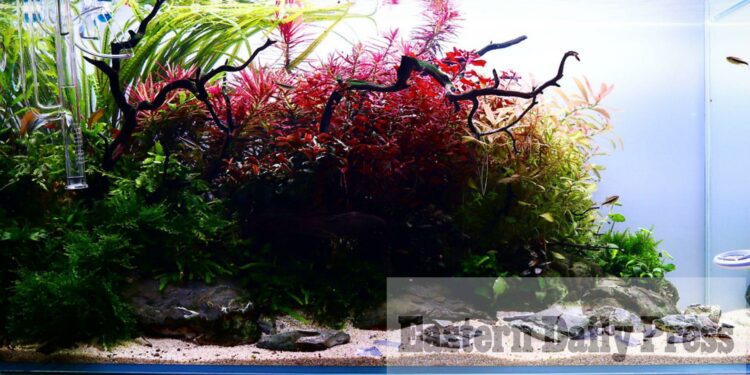- On average, you can expect a lifespan of about six months for a planted tank
- However, you can affect the lifespan of your aquarium
- If you mistreat your tank, you may end up having rotting plants with drop-dead livestock
What is needed for an aquascape? Some of the most common materials for aquascaping background include wood, cork, adhesive foliage or simple paint The role of the background is to hide the wall, hoses and cables and to help create in-depth perspective
Par ailleurs, Do fish like heavily planted tanks? Goldfish are likely to feed on any plants in the tank, so if you must keep them in a planted tank use plants that grow quickly Though there are definitely a few species you should avoid if you want to keep a planted freshwater tank, most species of freshwater tropical fish are safe for planted tanks
Du reste Do I need air pump in planted tank? In theory, a planted tank doesn’t need bubbles or even an air pump Anything that creates a current in the water will promote aeration and mechanical oxygenation You can frequently scoop water in and out of the tank as a means of circulation
Do you need a CO2 system for a planted aquarium?
CO2 is arguably the most important element in the planted aquarium It is required for respiration and growth by all aquatic plants, used in a process called photosynthesis Plants require a constant supply of CO2 during the light hours, otherwise they can suffer
Are LED lights good for aquarium plants?
Yes, aquarium plants will definitely grow under LED as long as the light emits in the right spectrum Regular white LEDs are great and will allow your plants to thrive
How often should I do a water change in a planted aquarium?
Especially if you have issues with algae or are establishing a new tank, you should consider doing tank changes twice or even three times a week Aquarium experts even recommend doing frequent changes when planted tanks are first established This helps prevent breakouts of algae and other contaminants
How many fish should be in a planted tank?
The most widely known rule for stocking a tank is the one inch of fish per one or two gallons of water rule
Is aquascaping difficult?
The whole aquascaping process may seem difficult to accomplish in the beginning But it’s not as hard as it looks if you follow a simple set of principles Like in the case of any creative development, aquascaping commits greatly to a reliable knowledge resource and relies heavily on your imagination
What are the different types of aquascape?
There are four main styles or types of aquascaping
- Iwagumi Style Also known as the Japanese Zen style, Iwagumi tanks are very minimal
- Jungle Style
- Nature Aquarium
- Wood
- Fish or Shrimp
- Simplicity Is Your Friend
- Do Your Plant Research
- Proportion and Rule of Thirds
What is the best size tank for aquascaping?
In general, you can’t go wrong with a 10-gallon tank, or preferably a 20 gallon+ tank
What is Dutch style aquascape?
Dutch style aquascapes are focused on showing off the beauty of aquatic plants by playing on the contrast in texture, shapes and colors of different aquatic plants Little or no hard scape (rocks/wood) is used In 1956, the Dutch Society for Aquarists (NBAT) established the initial set of published guidelines
How do you aquascape rocks?
How long does an Aquascape last?
On average, you can expect a lifespan of about six months for a planted tank However, you can affect the lifespan of your aquarium If you mistreat your tank, you may end up having rotting plants with drop-dead livestock
Do you need soil in planted aquarium?
Aquarium plants need to be planted in a mixture of substrate materials such as soil, sand, or gravel to promote good aquarium health Soil substrate helps plants root easily and acts as a sturdy anchor, so they stay upright It also provides them with the nutrients necessary for optimal growth
How deep should a planted tank be?
Plant health She reports that 1 inch of soil and 1 inch of gravel is the most optimal depth for her tanks This can be applied to all aquatic plants You may be thinking to yourself, “What about the heavy rooters?” Fear not, even those will thrive





